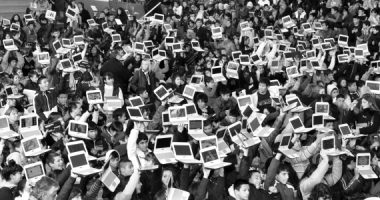
A group of people lifting a giant inflatable ball. Cronulla, Austraila, 1939 | State Library of New South Wales | Public domain
The internet is the most decentralised achievement in human history, the most effective and efficient machine ever invented to put knowledge within the reach of the majority and at the service of grassroots social organisation. Which is why, despite its privatisation and the appropriation of our data and content, it is still possible to imagine other futures for the net. Courtesy of consonni, we publish a preview of Las redes son nuestras (The networks are ours), a book by Marta G. Franco.
Thefts and losses
Eight years ago, the internet was stolen from us. We’d gone too far, and they took it away from us. Starting in 2011, when the internet became synonymous with social media, we organised the Arab Spring in Tunisia and Egypt, Geração à Rasca in Portugal, 15M in Spain, Occupy Wall Street in the US, YoSoy132 in Mexico, Occupy Gezi in Turkey, Vem Pra Rua in Brazil… Millions of us used social media to generate the noise, propaganda and furore that fuelled mass social movements. We drove a diverse range of political changes, but even though we might consider them to be insufficient, the fact is that we went too far. The forces of evil reorganised themselves – they learned from our collective intelligence tactics and turned them into a set of methods for cheating and bullying. They have benefitted everyone from Trump to Vox and Milei, in an alignment that we could call Hate International. Now, those platforms that helped us find each other and organise ourselves are a minefield of unpleasant experiences. Actually, it was the second time that the internet was stolen from us. It happened before, when the business model emerged based on monetising the social dynamics that we had invented. It was the anti-globalisation movement that began to program webpages where anyone could publish with just one click. It was 1999, and the aim was to get the word out about demonstrations and publish the videos. Later, Google bought the technology that was used to launch Blogspot and took over YouTube. The trend of users creating content became known as Web 2.0, and we were told that it placed us at the centre. They forgot to mention that our role would be to work for free 24/7 to produce the most valuable raw material – data. It was a fantastic coup to get the internet back into the claws of an industry that was then at a low ebb.
In fact, eight years ago may well have been the third time the internet was stolen from us. Going back even further, it’s well known that when it was created, the World Wide Web was a thing of nerds and enthusiasts who wanted to share ideas in chat rooms and websites with dodgy aesthetics. Unfortunately, the smartarses arrived and tried to turn it into a business through the dotcom IPOs, whose bubble burst at the turn of the millennium, but not before the amateurish charm of the invention had been obliterated forever. So, if we have to give a number of thefts, it may well be three. This timeline of collective intelligences and capitalist takeovers has been recounted many times, but here I would like to run through it while leaving out the myths. Even if we believe that the technical layer of what we now call the internet was designed in Silicon Valley (and even this would be giving them too much credit), the invention and continuous innovation in its uses is a global creative work, mostly from below and, basically, with a sparse presence of rich white American men. It takes an exercise in internet history to highlight the role of hacklabs, public research centres, streamers pounding the sidewalks and ladies sending memes to WhatsApp groups, among many other actors that don’t usually appear in epic tales of successful entrepreneurs.
Going through this history of victories – because if we were robbed and lost three times it’s because before that, three times, we were winning – is not an exercise in impotent nostalgia, but a way to remember that winning is possible. That the internet can be a place for learning, cooperating and working towards something that is much more like the world we would like to live in.
The cracks are appearing
In the spring of 2020, something happened that had a decisive impact on many areas, including the internet – those pandemic weeks in which millions of us stayed at home changed our relationship with digital environments. Those who, until then, hadn’t paid much attention to them also realised that they’re full of rubbish. By the time we were able to go outside, everyone knew that social media is a toxic habit.
But the pandemic was just the straw that broke the camel’s back – our love affair with social media had already been deflating for some time. For Mark Zuckerberg to want to change the name of his company to the bland Meta, he had to suffer a series of setbacks that included the Cambridge Analytica scandal, the loss of interest in the Facebook wall (where nowadays you’ll only find your parents), the obsolescence of the plastic influencers that populate Instagram and the realisation that his products were so out of date that even moving them to a new meta-universe wouldn’t save them. No one would have believed it four or five years ago, but Facebook Inc. no longer exists, and its successor is neither a leader nor does it look like it will ever get on its feet.
The decline of commercial social platforms has progressed hand in hand with the perception that they are a problem for democracy. Hacktivists had long warned that they were highly problematic as a space for public debate. Sadly, it took a man with the charisma of Pepe the Frog to become US president to prove them right. The storming of the Capitol in January 2021 attested to the fact that liberal democracy is broken; the replay two years later by Bolsonaro supporters reminded us that it’s not easily fixed. The fact that the far right is ruling or knocking on the doors of so many governments is also conclusive, even pushing Brussels to demand increased regulation and accountability. However, given the number of ills perpetrated by political, media and economic powers in the neoliberal era, it is absurdly reductionist to blame the decline on algorithms.
The downturn is proving hard, and tech companies have laid off several hundred thousand workers. The list is led by Meta, but Amazon, Twitter and Netflix are also high on the list. Data extractivism is being renewed by designing applications for something they call “artificial intelligence,” which has the virtue of generating mediocre texts and ugly images after swallowing content created by people they don’t want to pay. But the new business model is not enough to share the pie across San Francisco, and the investors who fund the promises of profits are losing patience. “Tech bros” have been reduced to the caricature we always suspected they were. The grotesque spectacle that Elon Musk is making of his attempt to put Twitter at the service of his anti-political agenda is terrible news because it leaves us without alternatives for global conversation. However, the fact that Mastodon has accrued millions of inhabitants may indicate interesting times ahead for self-hosted infrastructures.
If we have learned anything over these few years, it’s to avoid optimistic and naïve outlooks. The internet is no longer a place that is amenable to experimentation and learning. It is now the dense, addictive, anxiety-triggering land where unicorns live and get rich selling hot air, and where data analysts and content creators survive at the cost of their mental health; where you can earn enough money to buy a house in Andorra, but can also have your life ruined if someone digs up something inappropriate that you wrote years ago. The internet is the birthplace of the applications that are making our working and living conditions more precarious. We have lost our innocence, but also our trust. Which is why the will to look outwards and the interest in inventing new worlds is coming back.
And the lights that illuminate unknown realms
The fact that the price we pay for using the internet is getting higher and higher has a flip side – the social contract with the big tech companies is breaking down. We are bombarded with texts and gurus offering self-help formulas and, to a lesser extent, the politicisation of discomfort. We talk about digital detox, the right to disconnect, resources to bring down fake news and collective counterattack measures. We want to build our own agenda, our own media, our own fake news. There must be life beyond the commercial platforms. Finally, there is talk of the need to provide digital infrastructures as public services. If the state is in charge of maintaining libraries, schools and pavements, why not also spaces for conversation on the internet? I don’t think the state would be the best way, because we have had too many experiences where it wasn’t, but I don’t know of any means of intervention that is so transversal and hegemonic, so we will have to push in that direction.
It may also be necessary to promote more channels for public-private partnership, but without forgetting a third way – that of the commons. This is the one that interests me most because it is the best way to achieve social justice. Since the 1980s, the free software movement has been proving itself to be a very solid formula for development. At first glance, the free culture movement may seem to have got stuck in 2002 with the creation of Creative Commons licences, but a more understanding look will highlight the fact that Wikipedia continues to exist and has not stopped growing. We will have to recycle all the lessons learned over these decades to make sure that the third sector and social movements are prepared to face the renewed interest in self-managed digital spaces.
Another good amount of support for change is coming (surprise, surprise), from trade unions – hardly anyone saw it coming, but the strikes at Amazon and Uber and the organisation of riders are having relative success in twisting the arms of some big data merchants and winning rights, at least in Europe. Meanwhile, although they are far from being feasible alternatives for everyone, attempts to create apps to sell services more ethically, initiatives to create low-tech solutions and gadget-repair workshops can only pull in the same direction. All of this adds up to workers and consumers gaining autonomy from big business.
There is still much to do and to imagine. It will even be necessary to rethink the very idea of technology – to redefine the old notion of what development is and is not, to investigate who is behind the invention of the networks themselves, to think of ways to ensure that future designs are more participatory and connected to the real needs of the communities affected. We need to get off the rails laid for the locomotives of the billionaire overlords that are going to be derailed. To build other roads where we can move more comfortably. In the hybridisations of hackers with feminist, decolonial and climate justice movements there is a lot of initiative and a lot of strength to imagine a digital commons.





Leave a comment